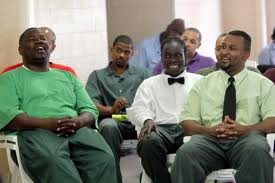My Night in Sing Sing
On Monday night I sat in the most exciting, powerful and inspirational circle I’ve experienced in years. I was conversing with convicted felons at Sing Sing prison—homicide, armed robbery, drug dealing.
We sat in a classroom, maybe fifteen of us from the “outside” and ten inmates. We had come to learn more about a program that allows inmates to study for and receive a college degree while behind bars—many were working on Masters degrees.
“Nobody from the outside sitting next to somebody from the outside!” the leader of our group called out. “Mix it up.” I found my way to a seat between two young men. One black, one Hispanic, both wearing hunter green pants (every inmate wears hunter green pants—the prep sheet we got from the prison said: no hunter green pants).
One by one the inmates introduced themselves and shared the story of how they had found a way out of hell by opening a book in a community of learners. Nearly every one of the convicts came from “the street.” Why go to high school when you’re not going to college—period. (Besides, you can make serious cash on the street as a kid.) Their stories simply confirmed what Michelle Alexander says in her book The New Jim Crow: there is a train that runs from the inner city streets to the prison gulag of this country, and if you’re a black male, you’re on that train. If you’re lucky and someone intervenes with compassion and hope and education and a sense of higher purpose, you can get off that train. Otherwise, no. The default is, you’re headed to prison.
One young man told us, “I’m here for multiple armed robberies.” Another said, “I’m here for a homicide. I was 16. A mixed up kid in a kill-or-be-killed world.” He’d served 22 years so far. “I got here by being negative, by hurting people. I never did one thing to make my family proud. But my college diploma—that hangs on my mother’s wall. She’s proud of me.”
There was a man I cannot forget. He had already gotten his Masters, years ago. He was now the de facto dean of the Big House college. His one mission—one only—was to go out into the “yard,” where young prisoners play ball and get into gangs and fights, and invite them to come open a book, learn, be something. He said, “I read Othello and that changed my life. Here was a man making these destructive choices. I saw Othello, and I saw myself.”
I found myself transfixed; my mouth was literally falling open. Why were these men so much more alive than the people in my world “outside”? Nobody in my world has a mission that clear. Nobody tells me—a stranger without green pants—his story of destruction and redemption, death and life. We are “privileged” to live on the outside, where we are on a mission to re-do the kitchen and where we suffer endemic anxiety over things like the graying of our roots and the chances that our children will not be admitted to a prestigious pre-school and the dwindling returns from our investments.
I always assumed that the reason the Bible insists that we visit those in jail, that we “Remember those who are in prison, as though in prison with them” (Hebrews 13:3), is because they need us. I am sure that is true. But I now know that we are sent into places like Sing Sing because we need them.

I truly believe that we all go through our own personal hell – whether it be addiction, loss, trauma in all forms, etc,- even the people of – don’t say it, don’t say it….Darien! Why are the men in Sing Sing so much more alive than the people in your outside world? To me, maybe it’s because they’re not expending all their energy trying to mask their frailties. They face it and they are reminded each day they wake up behind bars. I woke up behind my metaphorical bars one day because I couldn’t go on living my lie/life anymore. I reached out and shockingly wasn’t ostracized! What sweet relief to find out no one thought I was perfect in the first place after all!
Only one word: Amen
Love your story! I worked for a few years p/t as a Clinical Supervisor at Riker’s Island in NYC. I found what you found even no one would be there for over one year in the sentenced men’s bldg. Over one year they went upstate. I had a small caseload of patients from the General Population and for awhile co-led an HIV group. What I found was a mixed bag of humanity, many bright but not educated, many talented artists, musicians, writers, poets, spiritual and not, religious and not, all grateful for the help we offered. There were other more troubled souls of course. I always say I got from that experience more than I gave and to this day feel grateful at having had the experience.
Best,
Eleanor
Hi David,Another great experience and you write about it so beautifully!
You have done many things but this has to be one of the most memorable. clark
What a great experience, David, and very inspiring.
There are lots of ways to be behind bars, eh? So many of us who are “free” are more imprisoned than these men.